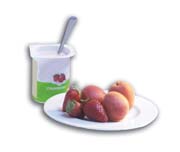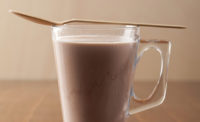
Sterols are ingredients that should be of particular interest to dairies. They have been well studied for 50 years and have clearly been shown to lower cholesterol levels to a clinically significant extent. These sterols help lower blood cholesterol because they are structurally similar to cholesterol, and consequently, compete with in-gested cholesterol for absorption through the small intestine. In essence, when plant sterols are present in the gastrointestinal tract, cholesterol absorption will occur to a lesser degree. Sterols themselves, interestingly enough, are not absorbed to the same degree as cholesterol (5-20-plus times less). They simply block cholesterol and are then excreted.
Sterols are safe and effective even in people with normal or only modestly elevated cholesterol who are already consuming low-saturated fat, low-cholesterol diets. Generally, one can expect up to a 10% decrease in response to one to two grams of sterols per day. Although this amount is difficult to obtain through the consumption of foods in their natural state, foods containing added plant sterols, including dairy products, vegetable spreads, salad dressings, orange juice and a slew of products about to enter the market, provide a new way for consumers to increase their sterol intake. Recent research indicates that consuming sterols once a day may be as effective as consuming the same total amount of sterols at three different meals.
In 2000, FDA issued an interim final rule authorizing an unqualified health claim for plant steryl esters in spreads and salad dressings that states "Foods containing at least 0.65g per serving of vegetable oil sterol esters, eaten twice a day with meals for a daily intake of at least 1.3g, as part of a diet low in saturated fat and cholesterol, may reduce the risk of heart disease."
In 2001, the American Heart Assn., concluded that plant sterols are a promising addition to dietary interventions aimed at improving cardiac risk profiles.
Not only is the health information on sterols significant, but consumers are connecting the dots between sterols and health. In fact, HealthFocus International, St. Petersburg, Fla., found that 61% of consumers want to learn more about sterols and cholesterol reduction. And, according to the Center for Disease Control, Atlanta, approximately 50 million adult Americans have high serum cholesterol levels.
Still, there is a need for industry to continue to produce convenient vehicles for consumers to use as a way to get the benefits of the cholesterol-lowering effects of sterols. Several studies have used yogurt with added steryl esters or free sterols. The tests demonstrated that consumption of sterol-supplemented yogurts significantly lowers serum cholesterol. Additionally, a study has been published indicating that plant sterols can "neutralize" the rise of serum cholesterol commonly observed with the consumption of butter.
Sterols, generally recognized safe (GRAS) for most dairy product applications, are easy for dairy processors to incorporate into formulations. In most applications, sterols can be dropped into existing systems with little or no processing changes. Also, there are minimal effects on taste and texture of dairy products fortified with sterols.
